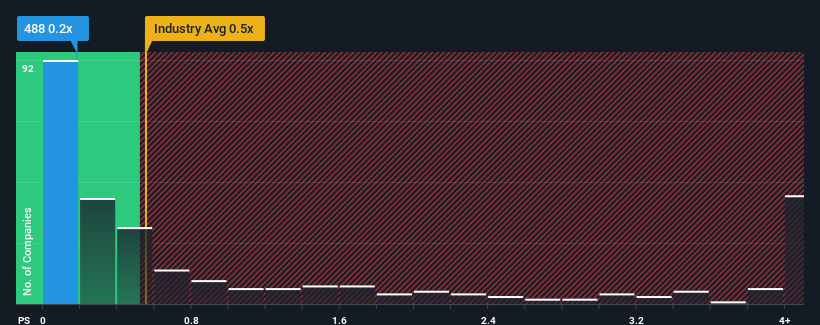- Hong Kong
- /
- Real Estate
- /
- SEHK:488
Lai Sun Development Company Limited's (HKG:488) Business Is Trailing The Industry But Its Shares Aren't
There wouldn't be many who think Lai Sun Development Company Limited's (HKG:488) price-to-sales (or "P/S") ratio of 0.2x is worth a mention when the median P/S for the Real Estate industry in Hong Kong is similar at about 0.5x. However, investors might be overlooking a clear opportunity or potential setback if there is no rational basis for the P/S.
Check out our latest analysis for Lai Sun Development

What Does Lai Sun Development's Recent Performance Look Like?
Revenue has risen firmly for Lai Sun Development recently, which is pleasing to see. It might be that many expect the respectable revenue performance to wane, which has kept the P/S from rising. Those who are bullish on Lai Sun Development will be hoping that this isn't the case, so that they can pick up the stock at a lower valuation.
We don't have analyst forecasts, but you can see how recent trends are setting up the company for the future by checking out our free report on Lai Sun Development's earnings, revenue and cash flow.What Are Revenue Growth Metrics Telling Us About The P/S?
The only time you'd be comfortable seeing a P/S like Lai Sun Development's is when the company's growth is tracking the industry closely.
Retrospectively, the last year delivered a decent 13% gain to the company's revenues. The latest three year period has also seen a 5.1% overall rise in revenue, aided somewhat by its short-term performance. Therefore, it's fair to say the revenue growth recently has been respectable for the company.
Comparing the recent medium-term revenue trends against the industry's one-year growth forecast of 5.6% shows it's noticeably less attractive.
In light of this, it's curious that Lai Sun Development's P/S sits in line with the majority of other companies. Apparently many investors in the company are less bearish than recent times would indicate and aren't willing to let go of their stock right now. Maintaining these prices will be difficult to achieve as a continuation of recent revenue trends is likely to weigh down the shares eventually.
The Key Takeaway
We'd say the price-to-sales ratio's power isn't primarily as a valuation instrument but rather to gauge current investor sentiment and future expectations.
We've established that Lai Sun Development's average P/S is a bit surprising since its recent three-year growth is lower than the wider industry forecast. When we see weak revenue with slower than industry growth, we suspect the share price is at risk of declining, bringing the P/S back in line with expectations. Unless the recent medium-term conditions improve, it's hard to accept the current share price as fair value.
Don't forget that there may be other risks. For instance, we've identified 3 warning signs for Lai Sun Development (2 are a bit concerning) you should be aware of.
If strong companies turning a profit tickle your fancy, then you'll want to check out this free list of interesting companies that trade on a low P/E (but have proven they can grow earnings).
New: AI Stock Screener & Alerts
Our new AI Stock Screener scans the market every day to uncover opportunities.
• Dividend Powerhouses (3%+ Yield)
• Undervalued Small Caps with Insider Buying
• High growth Tech and AI Companies
Or build your own from over 50 metrics.
Have feedback on this article? Concerned about the content? Get in touch with us directly. Alternatively, email editorial-team (at) simplywallst.com.
This article by Simply Wall St is general in nature. We provide commentary based on historical data and analyst forecasts only using an unbiased methodology and our articles are not intended to be financial advice. It does not constitute a recommendation to buy or sell any stock, and does not take account of your objectives, or your financial situation. We aim to bring you long-term focused analysis driven by fundamental data. Note that our analysis may not factor in the latest price-sensitive company announcements or qualitative material. Simply Wall St has no position in any stocks mentioned.
About SEHK:488
Lai Sun Development
Invests in, develops, leases, and sells real estate properties in Hong Kong, Mainland China, Macau, the United Kingdom, Vietnam, and internationally.
Slightly overvalued with very low risk.
Similar Companies
Market Insights
Community Narratives



